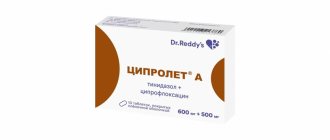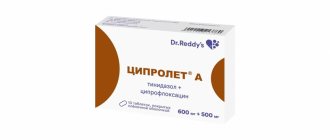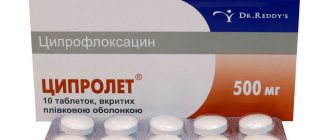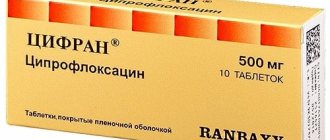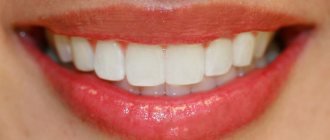Throughout his life, a person often encounters the negative effects of microbes on the body. Bacterial pathogens can settle on the skin, in the gastrointestinal tract, in the genitourinary organs and even on the conjunctiva of the eye. In such a situation, only a strong antibacterial agent will help cope with the infection. Most often, treatment begins with medications based on ciprofloxacin, so doctors often prescribe the antibiotic Tsiprolet to patients. Next we will talk about the beneficial properties of this medication.
Release form
Tsiprolet is produced by many pharmaceutical companies, as it is one of the most popular antibacterial agents. It is produced in the following dosage forms:
- infusion solution - in polyethylene bottles of 100 ml, where the content of ciprofloxacin does not exceed 2 mg per ml;
- tablets - each containing 250 mg or 500 mg of the main active ingredient, they are packaged in blisters of 10 pieces;
- eye drops - sold in bottles with a dropper of 5-10 ml, which contain 3 mg of ciprofloxacin per 1 ml of solution.
According to the instructions for use of Tsiprolet 500, these tablets contain the maximum dose of the active substance. They are used to treat severe bacterial lesions in advanced infections.
Tsifran or Tsiprolet which is cheaper
Tsifran and Tsiprolet are effective prescriptions against sore throat. In addition to ciprofloxacin, Cifran contains tinidazole; this combination enhances the effect against tonsillitis provocateurs. Prevents division and leads to the death of bacterial microorganisms. A common tablet form (recommended for angina) includes 500 mg of ciprofloxacin, the daily dose for an adult is 1000 mg (there are also 1000 mg tablets available, in which case 1 Cifran tablet is taken per day).
Comparing the prices for both products (Cifran 500 mg and Tsiprolet 500 mg), we come to the conclusion that the cost of the first is 2-3 times higher. However, the final decision on prescribing Tsiprolet, Tsifran or Augmentin depends on the attending physician and the results of preliminary diagnostics.
Mechanism of action of the drug
Tsiprolet belongs to the group of fluoroquinolones and is an antibacterial drug with a wide range of effects. Its main active ingredient is ciprofloxacin. This chemical compound has the ability to penetrate the DNA structure of the cells that cause the infection, thereby disrupting the vital functions of bacteria, their ability to subsequently reproduce and develop. The result of this influence is the death of harmful microorganisms.
Tsiprolet tablets have a complex effect, effectively destroying microbes that are both at the reproduction stage and in the resting phase. The spectrum of negative effects of this medicine extends to almost all types of gram-positive and gram-negative bacteria, most of the anaerobic pathogens. The instructions for use of Tsiprolet state that its main active component actively eliminates bacterial microflora that are resistant to other antibiotics, for example, the nitrofuran or sulfonamide series. Resistance of microbes to this medicine appears only after a long period of time.
Indications
Ciprofan tablets - what do they help with? This antibiotic is used for the treatment of complicated or uncomplicated bacterial infections that are caused by strains of microorganisms sensitive to ciprofloxacin. The remedy is indicated for the following diseases:
- urinary tract infections;
- bacterial lesions of the gastrointestinal tract;
- sepsis;
- pathologies of ENT organs, especially in case of infection with staphylococcal microflora and gram-negative bacteria, including the Pseudomonas type;
- peritonitis;
- infectious lesions of the respiratory system (for example, pneumonia), if they are caused by Enterobacter, Staphylococcus, Klebsiella, Haemophilus influenzae, Legionella or microbes of the Branhamella, Pseudomonas species;
- inflammatory infectious diseases of the genital organs in men and women (prostatitis, adnexitis);
- infections of the musculoskeletal system and skin;
- some sexually transmitted diseases (gonorrhea);
- bacterial lesions of the eyelid and conjunctiva of the eyes;
- therapy and prevention of infections in patients with low immunity (for example, with neutropenia or after treatment with immunosuppressive drugs).
Dosage and methods of application
The antibiotic Tsiprolet is prescribed by a doctor after examining the patient. The dose of the drug is selected based on the type of infection, the severity of the disease and the patient’s condition. The dosage regimen is also influenced by the functional ability of the urinary organs and the person’s body weight (when used in adolescence and childhood).
For the most severe cases of infection and when it is impossible to take the medication in tablet form, Tsiprolet is prescribed in the form of infusion solutions. Then the intravenous infusions of the drug are gradually stopped, and the patient switches to internal administration of the medication. The tablets do not need to be chewed; they simply need to be swallowed whole and washed down with a small amount of water. Take Tsiprolet, regardless of food intake, 500-750 mg twice a day.
The duration of therapy depends on the severity of the pathology and can vary from 3 to 21 days. Usually the doctor prescribes the use of this antibiotic for a period of 7 to 14 days.
Tsipromed or Tsiprolet which is better
Despite the identical active ingredient (ciprofloxacin), Tsipromed and Tsiprolet differ in their scope of application and release form. The first remedy is effective for eye diseases and pathologies of the hearing aid caused by a bacterial provocateur; Available in the form of drops with antibacterial properties. The second is effective for sore throat and tonsillitis of identical origin; it is produced in the form of tablets and liquid for injection.
Tsipromed is an effective prescription for otitis media accompanying bacterial tonsillitis. The use of ciprofloxacin-based ear drops can quickly relieve pain and inflammation of the middle ear cavity.
Like Tsiprolet, the medicine is not prescribed to pregnant women, nursing mothers, or children under 12 years of age. The cost of appointments is in one price category.
Adverse reactions and contraindications for use
Tsiprolet very rarely causes allergic reactions. After treatment with this medication, the following side effects most often develop: dyspeptic disorders, nausea and vomiting, skin itching and rash, shortness of breath.
The use of this medicine is contraindicated in the following cases:
- during pregnancy;
- if you are allergic to ciprofloxacin and quinolone drugs;
- in adolescence and childhood;
- during lactation.
Tsiprolet is prescribed with caution to elderly patients. The medication is used only in special cases for people suffering from epilepsy, vascular pathologies, and organic diseases of the brain. Such patients are more likely to experience side effects due to taking the drug, so this antibiotic is indicated for them only in life-threatening situations. In case of allergic reactions and other complaints (for example, joint pain, myalgia), use of the medicine should be discontinued.
Contraindications and side effects
Despite the effectiveness of the drug, otolaryngologists are afraid to prescribe it due to the list of side effects during treatment. The manifestations are reversible, but mean that Tsiprolet is not suitable for tonsillitis for the patient and it is necessary to change the treatment protocol.
Contraindications to the drug include:
- age up to 15 years;
- period of pregnancy and lactation;
- individual intolerance to ciprofloxacin;
- mental instability;
- tendency to epileptic seizures;
- liver and kidney pathologies;
- atherosclerosis of cerebral vessels and problems with cerebral circulation;
- Treatment of older patients occurs according to an individually developed program that takes into account medical history, level of resistance, and general health;
- patients whose professional activities are related to high-precision production, machines, mechanisms, and driving vehicles.
Tsiprolet is characterized by good tolerance among patients. An extensive list of side effects does not require hospitalization and goes away after discontinuation of the drug. However, the occurrence is regarded as a reason to cancel the drug and replace it with an analogue. Negative manifestations when taking the drug:
- change in taste preferences, nausea, vomiting, loose stools, loss of appetite;
- liver failure, jaundice and hepatitis;
- arrhythmia, tachycardia;
- headaches and dizziness, loss of orientation, anxiety, depression, visual and hearing disorders;
- rash, redness, itching, urticaria, dermatitis, scabies on the skin; rarely - Quincke's edema and anaphylactic shock;
- painful urination due to the formation of salts, the presence of bloody impurities in the urine;
- changes in blood parameters (decrease in the level of leukocytes, erythrocytes and platelets, increase in sugar);
- changes in intracranial pressure leading to nosebleeds, convulsions, and blood clots;
- bronchospasm, hyperemia of lung tissue, asthma;
- arthritis, muscle pain;
- colitis;
- leukopenia.
Among the diagnosed side effects when treating angina with ciprofloxacin, patients most often note persistent insomnia, with normal sleep returning after the end of the treatment protocol. Among additional treatment conditions, doctors recommend refraining from:
- alcoholic and low-alcohol drinks;
- exposure to open sun;
- driving vehicles.
Special information
Tsiprolet is not effective against streptococci, so it is not prescribed for the treatment of pathologies caused by bacteria of this group. In case of severe infection by anaerobes and staphylococcal microflora, it is better to take the medication in combination with other antibiotics, which will help enhance the therapeutic effect of ciprofloxacin.
The instructions for Tsiprolet tablets indicate that this drug can have an effect on the patient’s body, changing the ability to concentrate. Therefore, it should not be used by transport drivers and persons servicing complex mechanisms and machines. It is unacceptable to use the medication in combination with alcohol. Tsiprolet is available only with a doctor's prescription.
Tsiprolet or Augmentin - what to choose
Augmentin and Tsiprolet are effective for angina, but they belong to different pharmacological groups. For this reason, co-administration is unacceptable, as well as replacing one medication with another in the treatment protocol without medical permission. When prescribing a potent drug for tonsillitis, the doctor conducts a bacteriological culture to identify the resistance of the pathogen to antibiotics of the penicillin group, macrolides and cephalosporins. If the result is negative (means that the antibiotic is effective), Augmentin is prescribed along with Tsiprolet. When choosing between two medications, consider their positive and negative sides.
The advantages of Tsiprolet include:
- effectiveness against bacterial microorganisms resistant to penicillin antibiotics;
- minimal negative impact on the gastrointestinal tract;
- the use of Tsiprolet does not change the intestinal and vaginal microflora in women, does not cause dysbacteriosis, candidiasis and vaginosis;
- prolonged action of the drug (12 hours between doses);
- course duration is 5-7 days;
- low cost.
Cons of Tsiprolet:
- an extensive list of side effects;
- inadmissibility in the treatment of children under 15 years of age;
- Contraindicated for pregnant and lactating women.
In comparison with Tsiprolet, Augmentin is characterized by the following undeniable advantages:
- the synergy of the components (clavulanic acid and amoxicillin) helps quickly eliminate the provocateur of sore throat;
- the drug is approved for use by children from 3 months;
- with caution, but acceptable in the 2-3 trimester of pregnancy;
- the list of contraindications is much smaller.
The disadvantages of the medicine are:
- negative impact on the microflora of the stomach and genital organs;
- the cost is 2-3 times more expensive;
- Duration of therapy - from 7 days.
Based on the stated characteristics, we draw the following conclusions:
- Augmentin is preferable in the treatment of sore throat in children, older patients, expectant mothers, and patients who have no contraindications to penicillin therapy;
- Tsiprolet is recommended for adults and older patients with gastrointestinal pathologies and intolerance to antibiotics.
